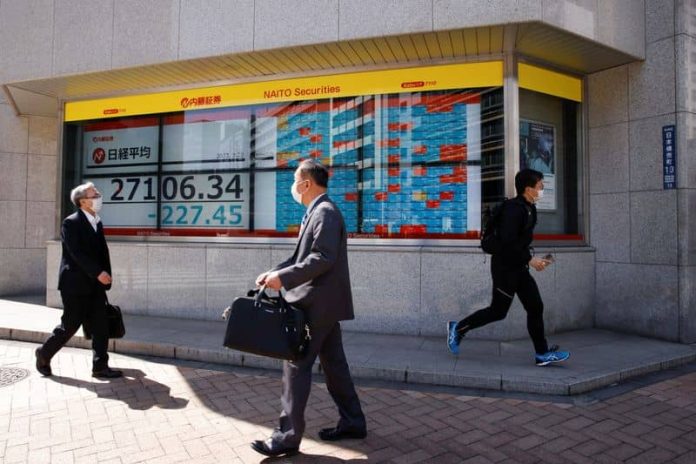SINGAPORE (Reuters) – Asian stocks gave up morning gains on Tuesday after creeping to two-week highs, as investors stayed cautious amid the standoff over the U.S. debt ceiling, while awaiting industrial sector surveys in Europe and the United States.
FTSE futures were largely flat while E-mini futures for the S&P 500 index rose 0.14%.
MSCI’s broadest index of Asia-Pacific shares outside Japan was down 0.03% by 0535 GMT, after touching its highest since May 9 a few hours earlier.
Japan’s Nikkei also dropped sharply from a 33-year peak, down 0.52%, as some investors swooped in to take profit following a breathless eight-day rally. (T)
“(Asia ex-Japan) momentum seems still being relatively modest,” said Redmond Wong, Hong Kong-based market strategist with Saxo Markets.
Investors’ key focus will be on U.S. personal consumption expenditures data and the minutes of the Federal Open Market Committee meeting, followed by initial jobless claims, Wong said.
“These three together will potentially give investors some new information about what the Fed will do in the June meeting.”
President Joe Biden and House Speaker Kevin McCarthy could not reach agreement Monday on how to raise the U.S. government’s $31.4 trillion debt ceiling with just 10 days before a possible default, but vowed to keep talking.
A positive outcome of the talks could prompt a risk-on trade environment, potentially leading to a decline in gold and a surge in equities, said Anderson Alves, a trader with ActivTrades.
Stronger-than-expected readings of upcoming U.S. data could spur further increases in U.S. short-term rate expectations ahead of the Federal Reserve’s June meeting, Alves said.
Minneapolis Federal Reserve President Neel Kashkari said overnight that it was a “close call” as to whether he would vote to hike again or pause at next month’s meeting.
St. Louis Fed President James Bullard said another 50 basis points of hikes might be required.
“The resumption of debt ceiling negotiations spurred some hopes, despite distinct risks of brinkmanship and blame-shifting remaining on the cards,” said Mizuho economist Vishnu Varathan.
“Without real action on that front, hawkish Fed speak has (had) some sway on markets,” he said, adding that some pressure on U.S. Treasuries has also lent support to the dollar.
Ten-year and two-year U.S. yields are near highs not seen since March, as traders start pushing back expectations for U.S. rate cuts from July towards November or December.
Benchmark 10-year Treasury yields rose for a seventh straight session on the remarks to hit 3.728% overnight, and held steady near that level in Asia.
Two-year yields were last at 3.875%.
The U.S. dollar tracked the move and hit a six-month high of 138.88 yen in the Asia session. Firm against most other currencies, the dollar traded at $1.0800 per euro and $0.6645 per Australian dollar.
Japan’s manufacturing activity expanded for the first time in seven months in May, survey data showed on Tuesday, while the service sector hit record growth, as recovery after COVID-19 gains traction.
Purchasing Managers Index surveys are due in Europe, Britain and the United States later in the day and strong services growth is expected to hold the composite readings in expansionary territory.
Oil prices kept climbing. Benchmark Brent crude futures rose 0.24% to $76.17 a barrel by 0535 GMT, while U.S. West Texas Intermediate crude was at $72.29 a barrel, up 0.32%.
Spot gold fell 0.45% to $1,960.5 an ounce.




















